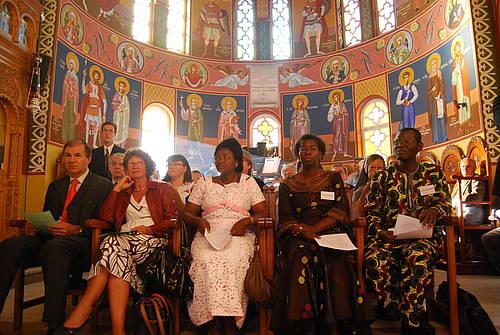by Juan Michel (*)
"The search for Christian unity is very costly, as well as slow and painful," says Metropolitan Gennadios of Sassima, of the Ecumenical Patriarchate of Constantinople. "And yet there is hope for the quest of church unity by God's grace."
Gennadios, a vice-moderator of the Central Committee of the World Council of Churches (WCC), speaks from a long experience within the ecumenical movement, which he began to serve as a young steward at the WCC assembly in Uppsala in 1968.
A key person in the organization of the 7-13 October meeting of the WCC Plenary Commission on Faith and Order at the Orthodox Academy of Crete, Gennadios was happy with the deliberations taking place in this Orthodox setting.
"Crete has a long tradition of hosting great ecumenical events. Due to the open-minded spirit of the Ecumenical Patriarchate, there is a favourable atmosphere here", says Gennadios. For historical reasons, Crete belongs to the ecclesial jurisdiction of the Ecumenical Patriarchate of Constantinople (today's Istanbul, Turkey).
For Gennadios, the "charisma" of the Faith and Order Commission is its ability to deal with difficult issues and a great variety of theological viewpoints. That has been achieved thanks to an attitude of cooperation in a spirit "of friendship and mutual understanding".
The Faith and Order Commission is regarded as the widest Christian theological forum in the world owing to the number of ecclesial traditions involved, the regions represented and the fact that its members are official representatives of their churches. It is made up of WCC member churches and others, including the Roman Catholic Church.
Not only are almost 80 percent of the current members new to the commission, but there is also a generational shift. "There are new faces; the older generation is gradually giving wayto younger people", says Gennadios. The average age of the 120 members is 48, and around 50 of them come from the global South.
Seeking unity from an Orthodox perspective
"There has been very rich participation by the Orthodox from the beginning", says Gennadios, who has been a Faith and Order staff member, as well as vice-moderator and moderator of the commission. "Important personalities, pioneers of the ecumenical movement in the Orthodox world, have been members."
Among the Orthodox contributions to ecumenical theological dialogue, Gennadios mentions the concept of "conciliarity", which refers to the relation in communion and unity in the faith between individual churches, the theology of the Holy Spirit, and an emphasis on the communion of the Holy Trinity.
That is despite the particular difficulty that the Orthodox church has when engaged in ecumenical dialogue, since "its thought forms and 'terms of reference' are different from those of the West". Given that the ecumenical movement works mainly with western patterns of thought, "Orthodox participants were, from the very beginning, forced to express their positions and points of view within a theological framework alien to […] the Orthodox Tradition."
Gennadios acknowledges that there is a certain "stagnation" in the present day ecumenical movement, leading sometimes to a "sense of frustration" regarding the lack of achievements in terms of church unity. However, he states, "we do have to bear in mind for how many centuries we have been divided!"
There have been real progresses. The 1982 Faith and Order text Baptism, Eucharist and Ministry (BEM), "was indeed a revolution for the ecumenical movement and for the churches," he says. "It has been the most translated ecumenical text ever, and is still used today, although to a lesser degree."
In the Orthodox world the BEM text has been, alongside other results from Faith and Order work, a tool often used in bilateral talks with confessions such as Catholics, Lutherans and Anglicans, and even between the two Orthodox families (the eastern and the oriental).
For Gennadios, the "crucial question" in current theological debate is "without doubt, ecclesiology", or, in other words, our understanding of the "One Church" and its nature.
Dialogue on their different ecclesiologies has enabled the churches in recent decades to reach a better understanding of one another and of themselves. Today what is needed is a renewal able "to promote an ecclesiology of more convergence".
According to Metropolitan Gennadios, for the Orthodox the aim is "not a naïve rapprochement, but unity in Christ". They hope for "a situation where in their ecclesiological space and insight of their church boundaries might be possible to recognize the others' ecclesial tradition".
Gennadios says there is need for a "spacing ecclesiology" – an enlarged understanding of the "One Church of Christ". Today, churches "are called to a new ecumenical 'ecclesial space of togetherness' in view of celebrating one day together at the Lord's Table." Within such a space churches would be drawn together on the condition that they all are "called to be the One Church".
"The unity of the Church will be achieved only if we, with repentance, humility and discernment, return to our common sources of the undivided church." The hope of achieving that is based on our belief that "in spite of this divided world, God's promise stands."
"We are all the people of God," Gennadios says. "And despite our being divided God's grace reaches out to all God's children."
(*) Juan Michel is WCC media relations officer.
